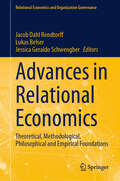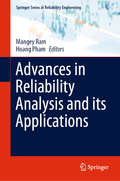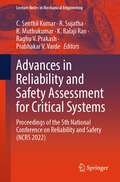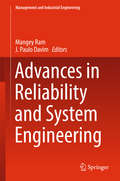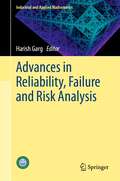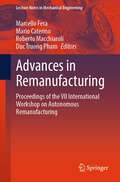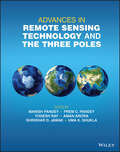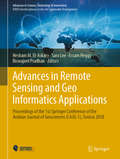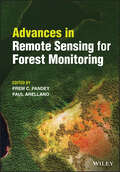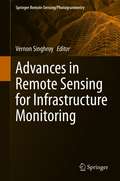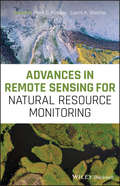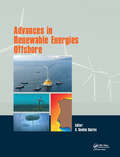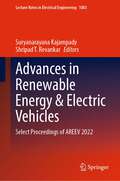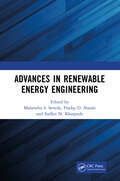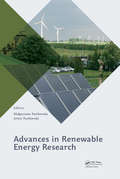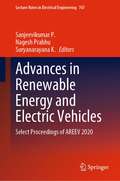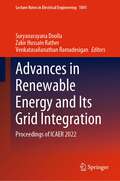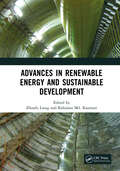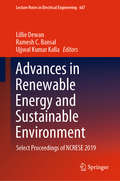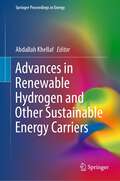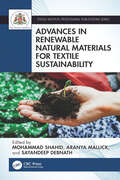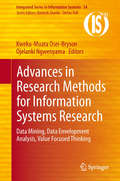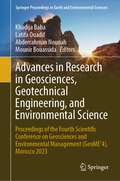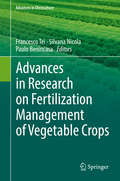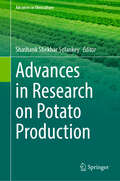- Table View
- List View
Advances in Relational Economics: Theoretical, Methodological, Philosophical and Empirical Foundations (Relational Economics and Organization Governance)
by Jacob Dahl Rendtorff Jessica Geraldo Schwengber Lukas BelserThis book explores how economic and social values are created through dynamic, non-linear interactions within cooperative networks. Emphasizing the importance of relations and networks in value creation, the book discusses critical issues such as the relational nature of the firm, relational management and leadership as well as relational philosophy. This includes topics such as network models, stakeholder management, relational contracts, cooperative economics as well as philosophical questions related to relational ontology, epistemology and methodology, inter alia. Written by leading scholars, the contributions highlight the need for new business models and governance mechanisms that integrate resources across different economic and social systems, advocating for a relational approach to economic theory. In turn, the book argues for a network-based, integrative view of businesses, suggesting that economic success is increasingly dependent on the ability to navigate and foster complex relationships within a globalized context. Rich in theoretical and empirical insights, this book is essential reading for academics, policymakers, and business leaders interested in the future of economic thought and practice. It provides a comprehensive overview of the relational paradigm. The book is an invitation to join the conversation on how relational perspectives can transform our understanding of economics, governance, and organizational dynamics.
Advances in Reliability Analysis and its Applications (Springer Series in Reliability Engineering)
by Hoang Pham Mangey RamThis book presents the latest research in the fields of reliability theory and its applications, providing a comprehensive overview of reliability engineering and discussing various tools, techniques, strategies and methods within these areas. Reliability analysis is one of the most multidimensional topics in the field of systems reliability engineering, and while its rapid development creates opportunities for industrialists and academics, it is also means that it is hard to keep up to date with the research taking place. By gathering findings from institutions around the globe, the book offers insights into the international developments in the field. As well as discussing the current areas of research, it also identifies knowledge gaps in reliability theory and its applications and highlights fruitful avenues for future research. Covering topics from life cycle sustainability to performance analysis of cloud computing, this book is ideal for upper undergraduate and postgraduate researchers studying reliability engineering.
Advances in Reliability and Safety Assessment for Critical Systems: Proceedings of the 5th National Conference on Reliability and Safety (NCRS 2022) (Lecture Notes in Mechanical Engineering)
by R. Muthukumar R. Sujatha Raghu V. Prakash Prabhakar V. Varde C. Senthil Kumar K. Balaji RaoThis book comprises select proceedings of the 5th National Conference on Reliability and Safety (NCRS 2022). It provides comprehensive state-of-the-art research and development in diverse areas like reliability prediction, precursor event analysis, fuzzy reliability, structural reliability, passive system reliability, digital system reliability, risk informed approach to decision making, dynamic PSA, uncertainty and sensitivity modeling, among others. The book is a valuable resource for researchers and professionals working in both academia and industry in the areas of complex systems, safety critical systems and risk-based engineering.
Advances in Reliability and System Engineering: Solutions And Technologies (Management and Industrial Engineering)
by J. Paulo Davim Mangey RamThis book presents original studies describing the latest research and developments in the area of reliability and systems engineering. It helps the reader identifying gaps in the current knowledge and presents fruitful areas for further research in the field. Among others, this book covers reliability measures, reliability assessment of multi-state systems, optimization of multi-state systems, continuous multi-state systems, new computational techniques applied to multi-state systems and probabilistic and non-probabilistic safety assessment.
Advances in Reliability, Failure and Risk Analysis (Industrial and Applied Mathematics)
by Harish GargThis book collects select chapters on modern industrial problems related to uncertainties and vagueness in the expert domain of knowledge. The book further provides the knowledge related to application of various mathematical and statistical tools in these areas. The results presented in the book help the researchers and scientists in handling complicated projects in their domains. Useful to industrialists, academicians, researchers and students alike, the book aims to help managers and technical specialists in designing and implementation of reliability and risk programs as below: Ensure the system safety and risk informed asset management Follow a proper strategy to maintain the mechanical components of the system Schedule the proper actions throughout the product life cycle Understand the structure and cost of a complex system Plan the proper schedule to improve the reliability and life of the system Identify unwanted failures and set up preventive and correction action
Advances in Remanufacturing: Proceedings of the VII International Workshop on Autonomous Remanufacturing (Lecture Notes in Mechanical Engineering)
by Duc Truong Pham Marcello Fera Mario Caterino Roberto MacchiaroliThis book features the papers presented at IWAR 2023. The overall objective of the event was to bring together international scientists and engineers to bridge the academic and industrial worlds in the field of remanufacturing. Various themes related to remanufacturing, including methods for operations management, methodologies for quality assessment and life cycle assessment, the integration of robots in remanufacturing, and the use of modern I4.0 technologies in a remanufacturing context among others were addressed. This book is intended for academics, graduate students, researchers, as well as industrial practitioners engaged in the field of remanufacturing.
Advances in Remote Sensing Technology and the Three Poles
by Prem C. Pandey Manish Pandey Yogesh Ray Aman Arora Shridhar D. Jawak Uma K. ShuklaADVANCES IN REMOTE SENSING TECHNOLOGY AND THE THREE POLES Covers recent advances in remote sensing technology applied to the “Three Poles”, a concept encompassing the Arctic, Antarctica, and the Himalayas Advances in Remote Sensing Technology and the Three Poles is a multidisciplinary approach studying the lithosphere, hydrosphere (encompassing both limnosphere, and oceanosphere), atmosphere, biosphere, and anthroposphere, of the Arctic, the Antarctic and the Himalayas. The drastic effects of climate change on polar environments bring to the fore the often subtle links between climate change and processes in the hydrosphere, biosphere, and lithosphere, while unanswered questions of the polar regions will help plan and formulate future research projects. Sample topics covered in the work include: Terrestrial net primary production of the Arctic and modeling of Arctic landform evolution Glaciers and glacial environments, including a geological, geophysical, and geospatial survey of Himalayan glaciers Sea ice dynamics in the Antarctic region under a changing climate, the Quaternary geology and geomorphology of Antarctica Continuous satellite missions, data availability, and the nature of future satellite missions, including scientific data sharing policies in different countries Software, tools, models, and remote sensing technology for investigating polar and other environments For postgraduates and researchers working in remote sensing, photogrammetry, and landscape evolution modeling, Advances in Remote Sensing Technology and the Three Poles is a crucial resource for understanding current technological capabilities in the field along with the latest scientific research that has been conducted in polar areas.
Advances in Remote Sensing and Geo Informatics Applications: Proceedings Of The 1st Springer Conference Of The Arabian Journal Of Geosciences (CAJG-1), Tunisia 2018 (Advances in Science, Technology & Innovation)
by Biswajeet Pradhan Hesham M. El-Askary Saro Lee Essam HeggyThis edited volume is based on the best papers accepted for presentation during the 1st Springer Conference of the Arabian Journal of Geosciences (CAJG-1), Tunisia 2018. The book compiles a wide range of topics addressing various issues by experienced researchers mainly from research institutes in the Mediterranean, MENA region, North America and Asia. <p><p> Remote sensing observations can close gaps in information scarcity by complementing ground-based sparse data. Spatial, spectral, temporal and radiometric characteristics of satellites sensors are most suitable for features identification. The local to global nature and broad spatial scale of remote sensing with the wide range of spectral coverage are essential characteristics, which make satellites an ideal platform for mapping, observation, monitoring, assessing and providing necessary mitigation measures and control for different related Earth's systems processes. <p> Main topics in this book include: Geo-informatics Applications, Land Use / Land Cover Mapping and Change Detection, Emerging Remote Sensing Applications, Rock Formations / Soil Lithology Mapping, Vegetation Mapping Impact and Assessment, Natural Hazards Mapping and Assessment, Ground Water Mapping and Assessment, Coastal Management of Marine Environment and Atmospheric Sensing.
Advances in Remote Sensing for Forest Monitoring
by Prem C. Pandey Paul ArellanoAdvances in Remote Sensing for Forest Monitoring An expert overview of remote sensing as applied to forests and other vegetation In Advances in Remote Sensing for Forest Monitoring, a team of distinguished researchers delivers an expansive and insightful discussion of the latest research on remote sensing technologies as they relate to the monitoring of forests, plantations, and other vegetation. The authors also explore the use of unmanned aerial vehicles and drones, as well as multisource and multi-sensor data – such as optical, SAR, LIDAR, and hyperspectral data. The book draws on the latest data and research to show how remote sensing solutions are being used in real-world settings. It offers contributions from researchers and practitioners from a wide variety of backgrounds and geographical regions to provide a diverse and global set of perspectives on the subject. Readers will also find: A thorough introduction to forest monitoring using remote sensing including recent advances in remote sensing technology Comprehensive explorations of sustainable forest management to enhance ecosystem services and livelihood security using a geospatial approach Case studies of monitoring the biochemical and biophysical parameters of forests, including carotene and xanthophyll content Practical advice on how to apply machine learning tools to remote sensing data Perfect for postgraduates, lecturers, and researchers in the fields of environmental science, forestry, and natural resource management, Advances in Remote Sensing for Forest Monitoring will also earn a place in the libraries of professionals and researchers working with remote sensing technology.
Advances in Remote Sensing for Infrastructure Monitoring (Springer Remote Sensing/Photogrammetry)
by Vernon SinghroyThis volume provides international case studies of practical and advanced methods using satellite images integrated with other airborne, drone images and field data to monitor infrastructure. The book is timely, as infrastructure spending by national governments is increasing and robust monitoring techniques are needed to keep pace with climate change impacts affecting infrastructures globally. The expert international contributions that comprise the book provide examples of advanced methods using InSAR, high-resolution optical and radar images, LIDAR, UAV, geophysical techniques and their applications to civil infrastructure. The case studies focus on high-resolution, rapid time-series radar interferometry to monitor highways, railways, pipelines, bridges, urban, and water conveyance infrastructures. Other case studies use optical and radar images to characterize urban infrastructure and monitor damages from floods, oil spills and conflicts. The case studies are global focusing on infrastructure projects in Canada, Dominica Guyana, India Italy, Syria Taiwan, United States and the United Kingdom. This compilation of selected case studies will provide useful guidelines for the civil infrastructure characterization and monitoring communities. The book will be of interest to infrastructure consultants and professionals, scientific communities in earth observation and advanced imaging methods, and researchers and professors in earth sciences, climate change, and civil and geoengineering.
Advances in Remote Sensing for Natural Resource Monitoring
by Prem C PandeySustainable management of natural resources is an urgent need, given the changing climatic conditions of Earth systems. The ability to monitor natural resources precisely and accurately is increasingly important. New and advanced remote sensing tools and techniques are continually being developed to monitor and manage natural resources in an effective way. Remote sensing technology uses electromagnetic sensors to record, measure and monitor even small variations in natural resources. The addition of new remote sensing datasets, processing techniques and software makes remote sensing an exact and cost-effective tool and technology for natural resource monitoring and management. Advances in Remote Sensing for Natural Resources Monitoring provides a detailed overview of the potential applications of advanced satellite data in natural resource monitoring. The book determines how environmental and - ecological knowledge and satellite-based information can be effectively combined to address a wide array of current natural resource management needs. Each chapter covers different aspects of remote sensing approach to monitor the natural resources effectively, to provide a platform for decision and policy. This important work: Provides comprehensive coverage of advances and applications of remote sensing in natural resources monitoring Includes new and emerging approaches for resource monitoring with case studies Covers different aspects of forest, water, soil- land resources, and agriculture Provides exemplary illustration of themes such as glaciers, surface runoff, ground water potential and soil moisture content with temporal analysis Covers blue carbon, seawater intrusion, playa wetlands, and wetland inundation with case studies Showcases disaster studies s
Advances in Renewable Energies Offshore: Proceedings of the 3rd International Conference on Renewable Energies Offshore (RENEW 2018), October 8-10, 2018, Lisbon, Portugal (Proceedings in Marine Technology and Ocean Engineering)
by C. Guedes SoaresAdvances in Renewable Energies Offshore is a collection of the papers presented at the 3rd International Conference on Renewable Energies Offshore (RENEW 2018) held in Lisbon, Portugal, on 8-10 October 2018. The 104 contributions were written by a diverse international group of authors and have been reviewed by an International Scientific Committee. The book is organized in the following main subject areas: Modelling tidal currents Modelling waves Tidal energy devices (design, applications and experiments) Tidal energy arrays Wave energy devices (point absorber, multibody, applications, control, experiments, CFD, coastal OWC, OWC and turbines) Wave energy arrays Wind energy devices Wind energy arrays Maintenance and reliability Combined platforms Moorings, and Flexible materials Advances in Renewable Energies Offshore collects recent developments in these fields, and will be of interest to academics and professionals involved in the above mentioned areas.
Advances in Renewable Energy & Electric Vehicles: Select Proceedings of AREEV 2022 (Lecture Notes in Electrical Engineering #1083)
by Shripad T. Revankar Suryanarayana KajampadyThis book presents select peer-reviewed proceedings of the International Conference on Advances in Renewable Energy and Electric Vehicles (AREEV 2022). The topics covered include renewable energy sources, electric vehicles, energy storage systems, power system protection & security, smart grid, and wide bandgap semiconductor technologies. The book also discusses applications of signal processing, artificial neural networks, optimal and robust control systems, and modeling and simulation of power electronic converters. The book is a valuable reference for academics and professionals interested in power systems, renewable energy, and electric vehicles.
Advances in Renewable Energy Engineering
by Mahendra S. Seveda Pradip D. Narale Sudhir N. KharpudeThis book on Renewable Energy Engineering consolidates the most recent research on current technologies, concepts and commercial developments in the field. It provides an overview of renewable energy engineering practices and technologies and details important concepts like designing of solar photovoltaic system, solar thermal systems, solar water pumping system, solar greenhouse, fuel cell technology, hydro power, wind energy technology, bioenergy, geothermal energy, etc.The subject matter is designed keeping in view the course curricula prescribed by central and state universities in India and abroad, and this book is aimed at students, researchers, academicians, scientists, teachers, policy makers, entrepreneurs, extension workers professionals and experts.Print edition not for sale in South Asia (India, Sri Lanka, Nepal, Bangladesh, Pakistan or Bhutan)
Advances in Renewable Energy Research
by Malgorzata Pawlowska & Artur PawlowskiAdvances in Renewable Energy Research comprises papers delivered at an international workshop by authors from Poland, Germany, Ukraine, China, Japan and Taiwan. The papers discussed the development of renewable energy technologies in certain countries, with special attention deviated to the conducted scientific research. The greatest attention was paid to the use of biomass, which uses resources that are readily-available in large quantities in all countries. The experience related to the use of biomass for energy generation was presented for certain countries, i.e. Germany and Japan as representatives of the most advanced countries in the field of energy generation from renewable sources, Taiwan and Poland, which have some experience in that area as well, and China and Ukraine, which have just started the introduction of renewable energy technologies. The greatest attention was devoted to the biogas production methods, i.e. chemical, biological, and mechanical pre-treatment methods, as well as enhancement of anaerobic fermentation and purifi cation of the biogas produced. -The development of solar (photovoltaic and thermal) methods and the use of heat pumps in residential buildings are also discussed, mostly with Polish experience asan example. Special attention is paid to research methods to be used for development of renewable energy technologies. Advances in Renewable Energy Research is useful for engineers and researchers working in the renewable energy area.
Advances in Renewable Energy and Electric Vehicles: Select Proceedings of AREEV 2020 (Lecture Notes in Electrical Engineering #767)
by Sanjeevikumar P. Nagesh Prabhu Suryanarayana K.This book presents select proceedings of the International Conference on Advances in Renewable Energy and Electric Vehicles (AREEV 2020), and examines related emerging trends, feasible solutions to shape and enable the development of mankind. The topics covered include renewable energy sources, electric vehicles, energy storage systems, power system protection & security, smart grid and wide band-gap semiconductor technologies. The book also discusses applications of signal processing, artificial neural networks, optimal and robust control systems, and modeling and simulation of power electronic converters. The book will be a valuable reference for beginners, researchers, and professionals interested in power systems, renewable energy, and electric vehicles.
Advances in Renewable Energy and Its Grid Integration: Proceedings of ICAER 2022 (Lecture Notes in Electrical Engineering #1041)
by Venkatasailanathan Ramadesigan Suryanarayana Doolla Zakir Hussain RatherThis book presents selected papers from the 8th International Conference on Advances in Energy Research (ICAER 2022), providing coverage encompassing advanced conventional energy technology, renewable and non-conventional energy technology, electric mobility, energy storage, energy, environment and society, industry innovations in energy, sector-coupled energy system, and energy education. The contents of this book are of use to researchers from not only scientific background, but also economics and anthropology. It encourages researchers to conduct research on the ways to assess and analyse the acceptance of the novel energy forms among the mass population from a financial and social perspective.
Advances in Renewable Energy and Sustainable Development: Proceedings of the International Conference on Renewable Energy and Sustainable Development (IRESD 2022), Nanning, China, 20–22 May 2022
by Zhoufu Liang Rafiziana KasmaniAdvances in Renewable Energy and Sustainable Development focuses on cutting-edge research areas including renewable energy and sustainable development. As a leader in the global megatrend of science and technology innovation, China has been creating an increasingly open environment for science and technology innovation, increasing the depth and breadth of academic cooperation, and building an innovation community that benefits all people. These efforts make a new contribution to globalization and the building of a community for a shared future. The proceedings feature the most cutting-edge research directions and achievements related to Renewable Energy and Sustainable Development. Subjects in the proceedings include: Hydraulic Engineering Environmental Science and Environmental Engineering Energy Engineering and Energy Technologies Green Manufacturing Energy Policy and Economics Energy Security and Clean Use Geothermal Energy
Advances in Renewable Energy and Sustainable Environment: Select Proceedings of NCRESE 2019 (Lecture Notes in Electrical Engineering #667)
by Lillie Dewan Ramesh C. Bansal Ujjwal Kumar KallaThis book comprises the select peer-reviewed proceedings of the National Conference on Renewable Energy and Sustainable Environment (NCRESE) 2019. The book brings together the latest developments in harvesting, storing and optimizing alternate and renewable energy resources. It covers latest developments in green energy technologies as well as smart grids, and their applications towards a sustainable environment. The book can be useful for beginners, academicians, entrepreneurs, and professionals interested in renewable energy technologies and sustainable environment practices.
Advances in Renewable Hydrogen and Other Sustainable Energy Carriers (Springer Proceedings in Energy)
by Abdallah KhellafThis book examines a broad range of advances in hydrogen energy and alternative fuel developments and their role in the energy transition. The respective contributions were presented at the International Symposium on Sustainable Hydrogen, held in Algiers, Algeria on November 27-28, 2019.The transition from non-renewable polluting energy to sustainable green energy requires not only new energy sources but also new storage techniques and smart energy management. This situation has sparked renewed interest in hydrogen and alternative fuels, as they could help meet these needs. Indeed, hydrogen can not only be used as a clean energy vector or as an alternative fuel, but also as a storage medium or as an intermediary that enables improved energy management.This text offers a valuable reference guide for those working in the professional energy sector, as well as for students and instructors in academia who want to learn about the state of the art and future directions in the fields of hydrogen energy, alternative fuels and sustainable energy development.
Advances in Renewable Natural Materials for Textile Sustainability (Textile Institute Professional Publications)
by Mohammad Shahid Aranya Mallick Sayandeep DebnathAdvances in Renewable Natural Materials for Textile Sustainability promotes sustainable practices in the textile industry through exploring the use of natural materials in textile production. The book delves into the advantages of using natural materials at every stage of textile processing, from fiber production to textile wet processing (dyeing, printing, finishing), and recycling after end use. The chapters provide critical discussions on natural materials for functional and smart textiles, sustainable methods of their preparation, application, and environmental impact of using biobased materials. It also discusses opportunities and challenges. Offers a comprehensive overview of the historical significance of natural fibers in textile production, the environmental impact of textile manufacturing, and the role of natural materials in reducing this impact. Provides examples of successfully implemented sustainable production processes. Discusses upcycling and repurposing of natural textile materials, sustainable textile waste management and recycling, and the use of natural colorants for dyeing and finishing textiles. Covers the use of biobased finishing agents, enzymes, and natural material-based auxiliaries in sustainable textile production and discusses biopolymers and nanocellulose and their potential in textile applications. Explores sustainable textile reinforcement using natural fibers and natural fiber-based composites and their applications. Considers the future of sustainable fashion and the role of natural materials in smart textiles for advanced applications like textile packaging, medical applications, textile sensors, and actuators, among others. With its comprehensive coverage, this book is an essential resource for professionals, researchers, and academics in the textile industry and anyone interested in sustainability in the fashion and textiles. It offers valuable insights for readers who want to make more informed choices and contribute to a more sustainable future.
Advances in Research Methods for Information Systems Research: Data Mining, Data Envelopment Analysis, Value Focused Thinking (Integrated Series in Information Systems #34)
by Kweku-Muata Osei-Bryson Ojelanki NgwenyamaAdvances in social science research methodologies and data analytic methods are changing the way research in information systems is conducted. New developments in statistical software technologies for data mining (DM) such as regression splines or decision tree induction can be used to assist researchers in systematic post-positivist theory testing and development. Established management science techniques like data envelopment analysis (DEA), and value focused thinking (VFT) can be used in combination with traditional statistical analysis and data mining techniques to more effectively explore behavioral questions in information systems research. As adoption and use of these research methods expand, there is growing need for a resource book to assist doctoral students and advanced researchers in understanding their potential to contribute to a broad range of research problems. Advances in Research Methods for Information Systems Research: Data Mining, Data Envelopment Analysis, Value Focused Thinking focuses on bridging and unifying these three different methodologies in order to bring them together in a unified volume for the information systems community. This book serves as a resource that provides overviews on each method, as well as applications on how they can be employed to address IS research problems. Its goal is to help researchers in their continuous efforts to set the pace for having an appropriate interplay between behavioral research and design science.
Advances in Research in Geosciences, Geotechnical Engineering, and Environmental Science: Proceedings of the Fourth Scientific Conference on Geosciences and Environmental Management (GeoME’4), Morocco 2023 (Springer Proceedings in Earth and Environmental Sciences)
by Mounir Bouassida Khadija Baba Latifa Ouadif Abderrahman NounahThe industrial acceleration intensifies the negative environmental impacts, mainly in some very sensitive geographical areas. Environmental problems like water stress, deadly floods, scarcity of building materials, and prolonged periods of drought affect southern countries, including African nations. This book comprises the peer-reviewed proceedings of the fourth scientific conference on geosciences and environmental management (GeoME'4), held in Salé, Morocco, on June 22–24, 2023. The book interests all researchers, practitioners, and students in geosciences, the environment, and water management.The book delivers a comprehensive overview of the latest research covering the following aspects of green technologies for sustainable water and wastewater management: nature-based solutions in the water cycle and advanced technologies in geosciences, geotechnics, and the environment. Additionally, it features six keynote speakers by international experts, providing valuable insights and further enhancing its value as a comprehensive resource on the following topics: Water management Environmental engineeringGeosciences and geotechnical engineering
Advances in Research on Fertilization Management of Vegetable Crops (Advances in Olericulture)
by Francesco Tei Silvana Nicola Paolo BenincasaThis book is a review of the recent literature on the key scientific and technical subjects of fertilization management in vegetable crops. In the last decades, research on fertilization management in vegetables was aimed at producing economical yields with reduced fertilizer inputs by the development and implementation of cropping systems, nutrient management approaches and crop varieties. Examples of the interventions in cropping systems included adequate crop rotations, inter-cropping, double cropping, and other strategies for a better soil organic matter management; nutrient management approaches included modelling, Decision Support Systems, crop nutritional status testing and precision agriculture technologies; amelioration of crop varieties has been directed toward higher nutrient/fertilizer use efficiency.
Advances in Research on Potato Production (Advances in Olericulture)
by Shashank Shekhar SolankeyPotato (Solanum tuberosum L.) is the world&’s third-most important food crop and the fourth-most important food crop in India. Potatoes are nutritionally rich, fat free, gluten free and high in dietary fibre. They are also a good source of vitamin C, vitamin B6, phenols, iron, potassium, phosphorus, magnesium and protein as compared to cereals. They are more energy-packed than any other popular vegetables and have the ability to combat hidden hunger, which is a major global health issue. The potato is also considered the &‘king of vegetables&’ due to its versatile uses and is an important staple food worldwide According to the FAOSTAT database (2023), global potato production in 2022 was 375 million tonnes, with the top producers being China (95.5 million tonnes) and India (56 million tonnes). The United Nations declared 2008 the International Year of the Potato (IYP) to increase awareness of the relationship that exists between poverty, food security, malnutrition and the potential contribution of the potato in defeating hunger. Moreover, this magical crop can generate a higher yield compared to the other crops; hence, it is one of the most notable crops to eliminate hunger and poverty. Therefore, sustainable potato production is important for food security and social welfare in future climate change scenarios. It is important to inform that potatoes have a shallow root system and are highly sensitive to environmental conditions and climate change. It is projected that potato yield may decrease up to 32 per cent by 2050 due to increasing temperatures and drought conditions. Thus, future potato breeding programmes should focus on enhancing abiotic and biotic stress tolerance through the utilization of the natural germplasm conserved in different gene banks along with climate friendly agronomical practices. Moreover, potato breeding should benefit from the effectiveness and ease of molecular techniques such as marker assisted selection, genome wide association studies, functional genomics and transgenics. The development of new potato varieties can also be achieved via genetic engineering and genome editing. Disease free potato seed production requires the integration of tissue culture methods, followed by the production of mini-tubers under an aeroponic system. As it is a staple food for millions and demand for potatoes will increase in the future, which makes this crop suitable for future research. Hence, the present book is formulated for professionals, researchers and post-graduate students who is working with advanced production, breeding and post-harvest technologies on potato crop specially in Indian perspective.
